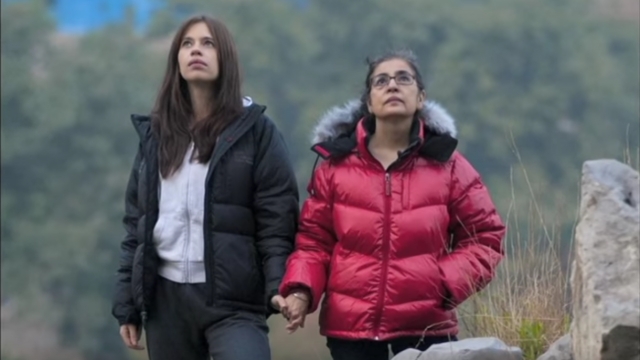Kalki Koechlin & Sabiha Sumar Talk About ‘Azmaish’, Their Upcoming India-Pakistan Documentary
Two years ago, Kalki Koechlin met acclaimed Pakistani director Sabiha Sumar (Khamosh Pani, For a Place Under the Heavens, Good Morning Karachi) at a film festival. Sabiha, who has lived in India for several years, was turning over an idea for a film that would explore religious identity in India and Pakistan. She was looking for a partner, and Kalki seemed like a natural fit. That project eventually evolved into Azmaish – Trials of Life, a documentary that features Sabiha and Kalki traveling through India and Pakistan, and trying to understand why people in both countries are turning to religious extremism for answers.
Photo courtesy Wishberry
The movie has finished filming, and just hours before this article was written, completed a successful crowdfunding campaign for its post-production expenses. Indian Nerve interviewed Sabiha and Kalki separately about the project. Here is what they had to say.
SABIHA SUMAR
Sabiha, you have achieved acclaim both for your feature films as well as your documentaries. Why did you decide to tackle the subject of Azmaish through a documentary as opposed to a feature? Don’t you feel that a feature may have attracted a larger audience?
For me the subject matter of a film decides whether it’s a documentary or fiction. The story I am telling in Azmaish needed real people talking about real life experiences. I couldn’t have found a more powerful way to tell this story if I tried to fictionalize the characters. It’s a documentary that hits you in the gut.
Which section, or sections, of Pakistani society do you think most need to watch this film? Do you have any plans to make sure the message reaches them?
Azmaish is meant for a world audience. We need to understand what direction our countries are taking and how this impacts our people – how we impact each other. My films are seen widely through broadcast, theatrical release and through film festivals. I also do a travelling cinema for small towns and villages to reach people who don’t have access to cinemas.
Did you have any prior notions about India or its people that were changed during the making of this film?
I found during the making of Azmaish that people in India and Pakistan are ahead of their leadership. And time has come to change the way we think about the poor and marginalized people in or societies. A new vision, a new world order is in the making. Azmaish is a witness to this change. I hope that people in India, Pakistan and beyond will recognize themselves and each other in Azmaish and rethink their preconceived notions of the other.
Your main collaborator on this film is the versatile and talented Kalki Koechlin, and her name may motivate a lot of Indians to watch this film. What can you tell us about her that Google can’t?
Kalki is a deeply honest and spiritual person. She is sincere and this is why she is so likeable on screen. The camera always catches the truth.
Lastly, the popularity of Indian films in Pakistan is well-documented,but not a lot of Indians know much about Pakistani cinema. Could you suggest some great Pakistani movies that a film buff could start with?
Sure. Watch Namaloom Afraad and Actor in Law , also watch Jawani Phir Nahee Anee and of course you must watch Khamosh Pani. There are a bunch of short films like Jeewan Haathi , Khamae may Mutt Jhankein, Lala Begum, Chotay Shah and LaluLal.com which give you a taste of the kind of work being produced in Pakistan.
KALKI KOECHLIN
The idea for this film originated before the cross-border hostilities we’ve seen between India and Pakistan over the last year or two, and the film now seems very timely. Is the timing a blessing or a curse?
I think it’s a bit of both. It’s obviously scary because nobody probably wants to discuss India and Pakistan right now. But at the same time, it’s when you find yourself disconsolate that you look the most for change, so in that sense I hope that it will be very timely.
You’ve made some wonderful and bold choices in your career. Given your inclination towards unconventional subjects, are you at all concerned that Azmaish may be seen as similarly offbeat? This sounds like an important film. What would you like to tell the mainstream audience that will make them watch it?
Well there’s no question that it is an offbeat movie. It’s a documentary, and it doesn’t have a commercial subject. You go in to a film like this knowing that it will be offbeat, and that’s precisely why you do it. As for the second part of the question, I don’t understand the concept of a ‘mainstream audience’. I may not be seen as mainstream, but I go watch Star Wars, I go watch the big Bollywood movies just like everybody else. I think most humans want all kinds of art and cinema. So the mainstream audience are just people, and I think people will find this film interesting. It regards all of us in two neighbouring countries that have been involved in conflict for so long, it’s in our best interests.
Which section, or sections, of Indian society do you think most need to watch this film? Do you have any plans to make sure the message reaches them?
I have no idea. There is no master strategic plan. We only wanted to raise a few important questions, so that we can start to address them together. The film will find its audience, although who that will be I can’t predict.
Did you have any prior notions about Pakistan or its people that were changed during the making of this film? Did anything about the country surprise you?
I didn’t know much about Pakistan going in. I knew that Pakistan loves films and loves Bollywood. The country was a discovery to me. What I found surprising is how agricultural it still is – it hasn’t industrialized to the extent that India has. I imagined it would be very similar to India, but Pakistan still has a significant feudal system, landlords own a large amount of land there.
Lastly, we wanted to get your take on Hindi cinema in 2016. Do you see the success of progressive films like Pink and Dangal as encouraging signs that our cinema, our audience and our society is growing?
Yes, has definitely been a gradual change. I also enjoyed Udta Punjab and Kapoor & Sons. I think now people are spoiled for choice – with the Internet, Netflix and what not – and they want that kind of choice from their local cinema as well. So yes, it’s great to see films like that succeeding. It’s very encouraging.
|
← Previous Story Film Geeks Podcast 005 | Top TV Shows 2017 Part 1
|
-
Advertisement
Copyright © 2020 Indian Nerve. All Rights Reserved.


1 Comment